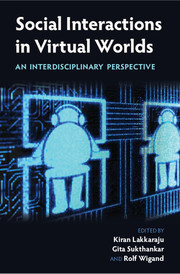Description
Social Interactions in Virtual Worlds
An Interdisciplinary Perspective
Coordinators: Lakkaraju Kiran, Sukthankar Gita, Wigand Rolf T.
This cross-disciplinary exploration of MMOs and other complex online worlds melds work from computer science, psychology and social science.
Language: English
Subject for Social Interactions in Virtual Worlds:
Publication date: 07-2018
452 p. · 16x23.6 cm · Hardback
452 p. · 16x23.6 cm · Hardback
Description
/li>Contents
/li>Biography
/li>
Within the rapidly-growing arena of 'virtual worlds', such as Massively Multiplayer Online Games (MMOs), individuals behave in particular ways, influence one another, and develop complex relationships. This setting can be a useful tool for modeling complex social systems, cognitive factors, and interactions between groups and within organizations. To study these worlds effectively requires a cross-disciplinary approach that integrates social science theories with big data analytics. This broad-based book offers a comprehensive and holistic perspective on the field. It brings together research findings from an international team of experts in computer science (artificial intelligence, game design, and social computing), psychology, and the social sciences to help researchers and practitioners better understand the fundamental processes underpinning social behavior in virtual worlds such as World of Warcraft, Rift, Eve Online, and Travian.
Part I. Individual Behaviors and Dyadic Relationships: 1. VERUS John Murray, Thomas Chesney and Robert Hoffmann; 2. Understanding aggressive and non-aggressive individual behaviors in MMOGs Iftekhar Ahmed, Andrew Pilny and Marshall Scott Poole; 3. From good associates to true friends Fanny Anne Ramirez; 4. Couples who slay together, stay together Elizabeth Craig, Nicholas Taylor and Sarah Evans; Part II. Groups: 5. Virtual team communication norms John C. Sherblom, Lesley A. Withers, Lynette G. Leonard and Jeffrey S. Smith; 6. Toxic allies and caring friends Maude Bonenfant, Laura Iseut Lafrance St-Martin, Félix Prégent and Lucile Crémier; 7. Management (im)material Nick Taylor, Suzanne de Castell, Jennifer Jenson and Ryan Hurley; 8. Virtual organization and online games Rolf T. Wigand; 9. Virtual economic experiments Thomas Chesney, Swee Hoon Chuah, Robert Hoffmann, Wendy Hui and Jeremy Larner; Part III. Understanding Culture with Games: 10. A simulated utopia William Sims Bainbridge; 11. Gaming in multicultural classrooms Amanda Paz Alencar and Teresa de la Hera Conde-Pumpido; Part IV. Techniques for Analyzing Game Data: 12. The power of social features in online gaming Fernando Kuipers, Marcus Martens, Ernst van der Hoeven and Alexandru Iosup; 13. Profiling in games Rafet Sifa, Anders Drachen and Christian Bauckhage; 14. Using massively multiplayer online game data to analyze the dynamics of social interactions Alireza Hajibagheri, Gita Sukthankar, Kiran Lakkaraju, Hamidreza Alvari, Rolf T. Wigand and Nitin Agarwal.
Kiran Lakkaraju is a Senior Member of the Technical Staff in the Sandia National Laboratories Cognitive Science and Applications group, New Mexico. His primary research interests lie in computational models of behavior change in society and exploring links between social and cognitive structures in problems of information dissemination and attitude change. His current work revolves around developing online social experiments through the Controlled, large online social experimentation platform.
Gita Sukthankar is Associate Professor and Charles N. Millican Faculty Fellow in the Department of Computer Science at the University of Central Florida (UCF), and an affiliate faculty member at UCF's Institute for Simulation and Training. Her research focuses on multiagent systems and computational social models. She received an Air Force Young Investigator award and an NSF CAREER award. She served on DARPA's Computer Science Study Panel and is currently a member of DARPA's Information Science and Technology study group and the board of directors of IFAAMAS.
Rolf T. Wigand is Maulden-Entergy Chair and Distinguished Professor Emeritus of Information Science and Business Information Systems at the University of Arkansas at Little Rock. He is the past director of the Syracuse University Graduate Program in Information Management and their Center for Digital Commerce. His research focuses on software standards development and collective action in the mortgage, automotive, and RFID industries, development of trust and leadership in virtual organizations, the analysis of social networks in disaster situations, and novel methods for analysis and tracking of collective action on social media.
Gita Sukthankar is Associate Professor and Charles N. Millican Faculty Fellow in the Department of Computer Science at the University of Central Florida (UCF), and an affiliate faculty member at UCF's Institute for Simulation and Training. Her research focuses on multiagent systems and computational social models. She received an Air Force Young Investigator award and an NSF CAREER award. She served on DARPA's Computer Science Study Panel and is currently a member of DARPA's Information Science and Technology study group and the board of directors of IFAAMAS.
Rolf T. Wigand is Maulden-Entergy Chair and Distinguished Professor Emeritus of Information Science and Business Information Systems at the University of Arkansas at Little Rock. He is the past director of the Syracuse University Graduate Program in Information Management and their Center for Digital Commerce. His research focuses on software standards development and collective action in the mortgage, automotive, and RFID industries, development of trust and leadership in virtual organizations, the analysis of social networks in disaster situations, and novel methods for analysis and tracking of collective action on social media.
© 2024 LAVOISIER S.A.S.

